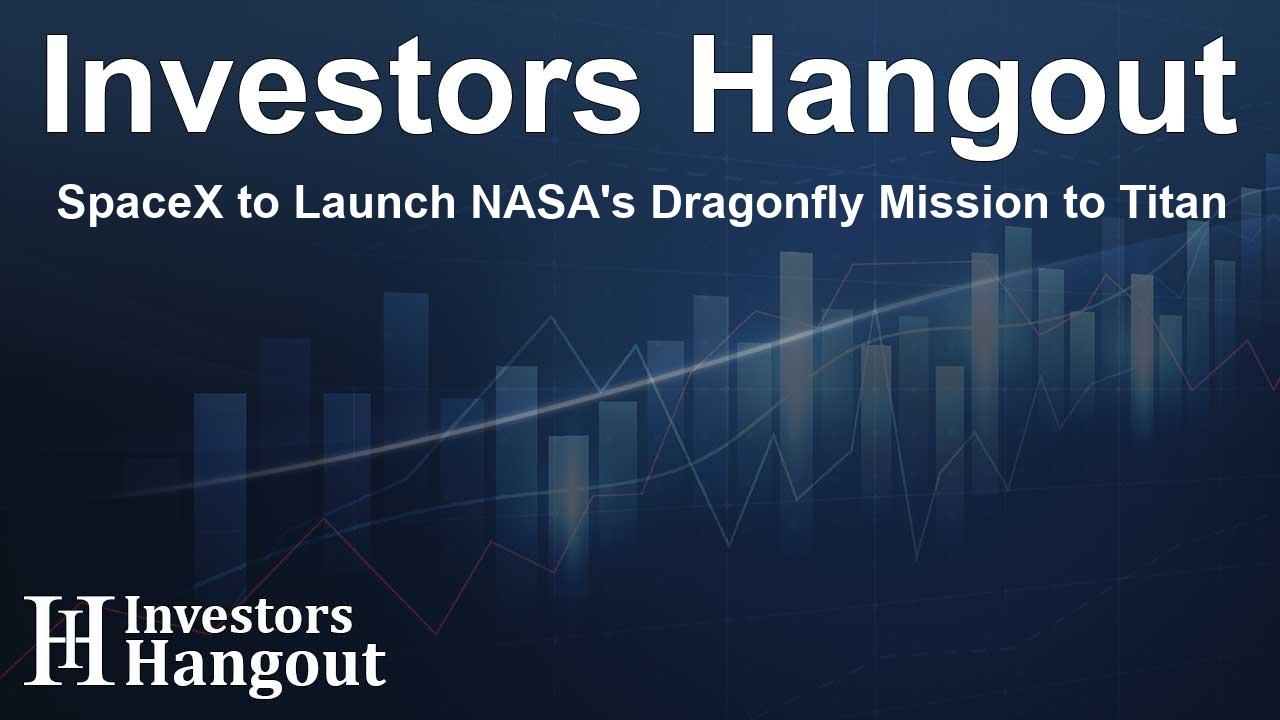SpaceX to Launch NASA's Dragonfly Mission to Titan

NASA Selects SpaceX for Groundbreaking Dragonfly Mission
NASA has exciting news! The agency has chosen SpaceX to provide launch services for its innovative Dragonfly mission. This rotorcraft lander mission falls under NASA's New Frontiers Program and is designed specifically to explore Titan, Saturn's intriguing moon.
Understanding Titan and the Dragonfly Mission
Titan is a fascinating celestial body, rich with carbon and featuring lakes of methane. The Dragonfly mission aims to uncover its secrets, sampling materials and analyzing the surface composition across various geological settings. This exploration is vital as it advances the search for the essential building blocks of life.
Engineered for Success
The contract awarded, valued at about $256.6 million, encompasses launch services and associated mission costs. The current timeline aims for a launch period slated for mid-summer 2028. It will utilize a SpaceX Falcon Heavy rocket, launching from the renowned Launch Complex 39A.
A New Era in Planetary Exploration
Dragonfly represents a novel approach to planetary exploration. Instead of a traditional lander, this mission will employ a rotorcraft that will navigate between various locations on Titan, gathering samples and conducting in-situ experiments. This versatility will enhance our understanding of Titan’s surface and atmosphere.
Scientific Goals of the Mission
The scientific objectives are ambitious. Dragonfly's payload will assess the habitability of Titan's environment, investigate the history of prebiotic chemistry, and search for potential indicators that could signify if life has ever thrived on this remote moon.
The Team Behind Dragonfly
NASA's Launch Services Program, operating out of Kennedy Space Center, is charged with overseeing the launch aspect of the mission. The Dragonfly team, managed at the Johns Hopkins Applied Physics Laboratory, comprises a diverse group of scientists and engineers with extensive experience on previous space exploration endeavors, making them well-suited for this complex mission.
Navigating the Future of Space Exploration
As part of NASA's New Frontiers Program, managed by Marshall Space Flight Center, Dragonfly stands as a critical mission within the agency's broader quest to explore our solar system. The collaboration involves experts in rotorcraft, autonomous flight, and other specialized fields crucial to the success of the mission.
Frequently Asked Questions
What is the purpose of the Dragonfly mission?
The Dragonfly mission aims to explore Titan, Saturn's moon, by sampling materials and analyzing its geological features, contributing to our understanding of the potential for life.
Who will conduct the launch for the Dragonfly mission?
NASA has selected SpaceX to provide the launch services for the Dragonfly mission.
When is the planned launch period for Dragonfly?
The mission is currently targeting a launch window between July 5 and July 25, 2028.
What makes Dragonfly unique?
Dragonfly will operate as a rotorcraft lander, allowing it to explore multiple sites on Titan, which is a novel method for planetary exploration.
What kind of team is working on Dragonfly?
A diverse team of scientists, engineers, and technologists with a wealth of experience in space missions is working on the Dragonfly project, led by NASA and partnered with global experts.
About Investors Hangout
Investors Hangout is a leading online stock forum for financial discussion and learning, offering a wide range of free tools and resources. It draws in traders of all levels, who exchange market knowledge, investigate trading tactics, and keep an eye on industry developments in real time. Featuring financial articles, stock message boards, quotes, charts, company profiles, and live news updates. Through cooperative learning and a wealth of informational resources, it helps users from novices creating their first portfolios to experts honing their techniques. Join Investors Hangout today: https://investorshangout.com/
Disclaimer: The content of this article is solely for general informational purposes only; it does not represent legal, financial, or investment advice. Investors Hangout does not offer financial advice; the author is not a licensed financial advisor. Consult a qualified advisor before making any financial or investment decisions based on this article. The author's interpretation of publicly available data shapes the opinions presented here; as a result, they should not be taken as advice to purchase, sell, or hold any securities mentioned or any other investments. The author does not guarantee the accuracy, completeness, or timeliness of any material, providing it "as is." Information and market conditions may change; past performance is not indicative of future outcomes. If any of the material offered here is inaccurate, please contact us for corrections.